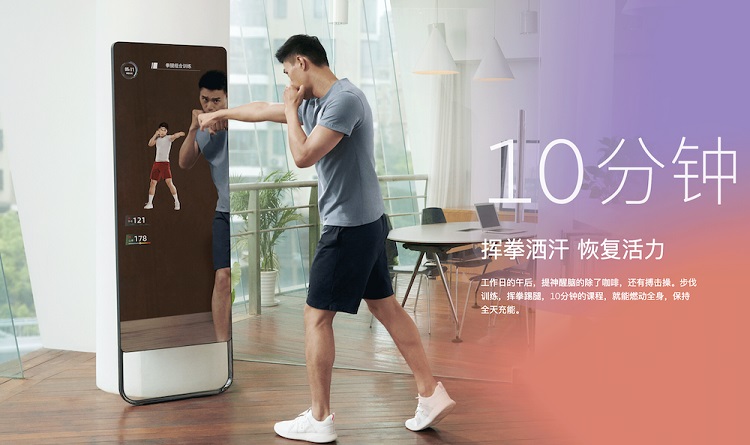Here’s Looking at You…Through Chinese Fitness Mirror

Fiture, the heavily backed Chinese fitness equipment manufacturer, readies aim at Europe and U.S. markets.
If anyone thinks that solid expansion within the Chinese fitness market should be satisfying, think again. Fiture — a major leader in China — is getting ready to target its mirror-like fitness device to both individuals and service providers — including hotels and gyms — in both Europe and the United States.
In only two years since it started, Fiture has taken control of China’s fitness market.
“We have almost 100 per cent market share in the sector in China. We do not have competitors at the moment,” says Fiture co-founder Richard Zhang.
Still, that’s obviously not generating complacency. After all, it’s not like Apple decided since it had a great U.S. market it needn’t target China.
With over $400 million now raised, Fiture execs feel comfortable in their ability to tackle current leaders — including Lululemon’s Mirror, Peloton, and Germany’s VAHA — in a global fitness market that’s already at US$5.5 billion. And that’s a number expected to rise over 31% by 2027, to close to US$50 billion.
Dollars made sense
“People [in China] are willing to pay and the market is growing fast,” Zhang said.
One growth is seen in the traditional gym market in that country: from 500 outlets in 2001 to 50,000 by 2019. Still, prior to Fiture’s competition, the U.S. was the leader in China’s $7 billion fitness market.
It was with backing by China’s leading internet provider, Tencent Holdings, and Adrian Cheng Chi-kong of New Wave Development, that the company really took over and could expand future outreach. That outreach accelerated as the pandemic, and the focus on shut-in fitness needs, made residents even more willing to purchase in-home exercise options.
Variety attracts attention
As Zhang said, “We want to use technology to … make sure we can provide fitness products available to everyone.” Experts say the Fiture mirror’s AI technology, coupled with a true understanding of the Chinese fitness market, were key factors in this success. As one report noted, thanks to this understanding the AI was designed to be both a personal trainer and offer group classes.
This is just one tech capability individuals gain through Fiture’s mirrors. Whereas the German VAHA offers 200 workouts, Fiture’s mirror allows all age groups — including children and seniors — to access 5,000 interactive courses.
Fiture’s individual mirrors sell at 7,000 yuan (US$1,083), whereas Lululemon’s Mirror runs about $1500 per unit. And Fiture recently said it has a new series which sells for only 4800 yuan (about $741).
Though based in Baltimore, MD, Wendy J. Meyeroff has been an internationally published reporter on health, fitness, and tech for both B2B and B2C audiences for over 20 years. Among her collaborations are CBS (launching it’s consumer health site), Senior Wire News Syndicate, Vision Industry Council of America, Healthcare Informatics, Good Housekeeping and Weight Watchers.



